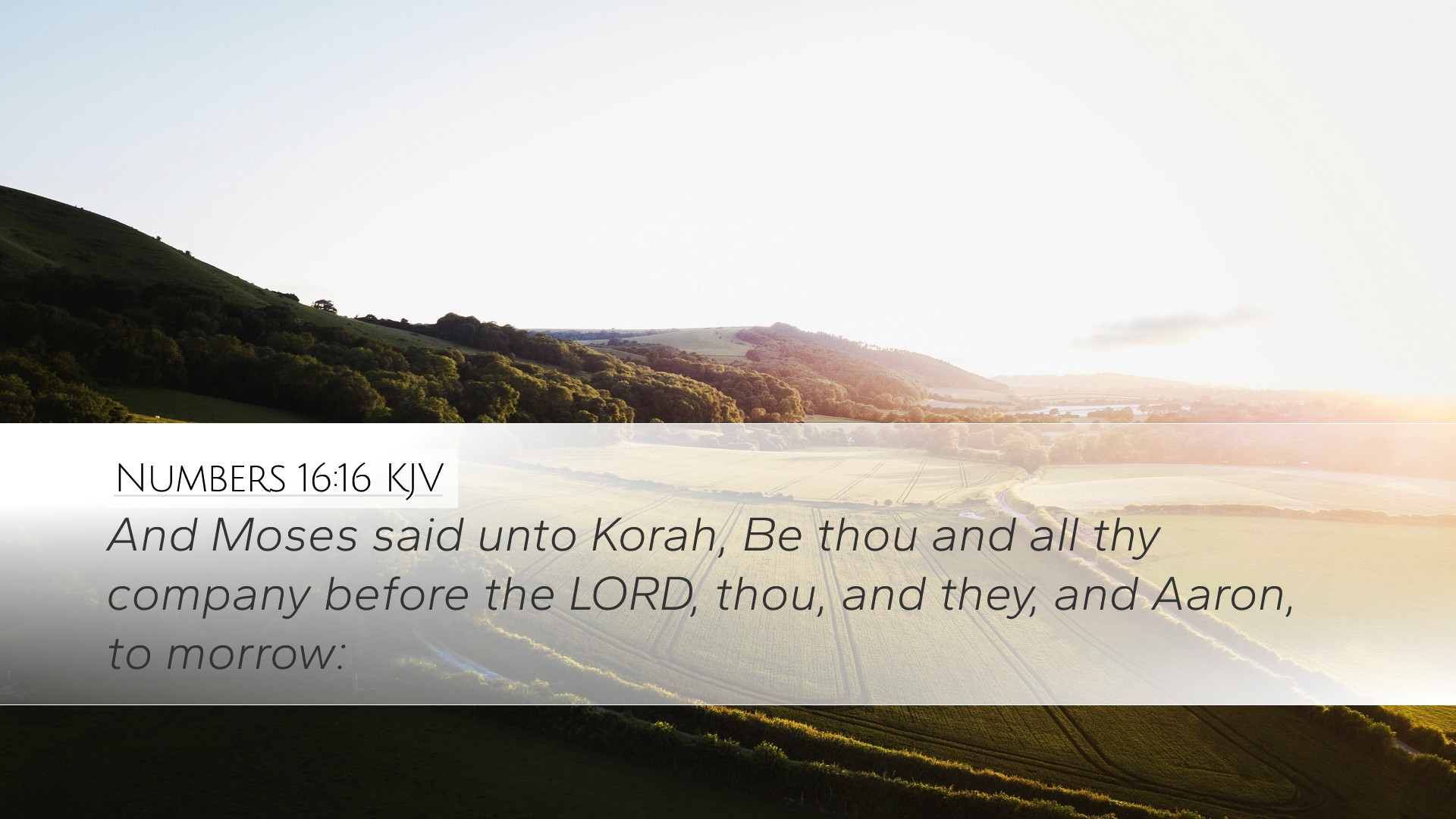Commentary on Numbers 16:16
Verse: Numbers 16:16 - "And Moses said unto Korah, Be thou and all thy company before the LORD, thou, and they, and Aaron, tomorrow."
This verse serves as a pivotal moment in the narrative of rebellion against Moses' leadership in Israel. Understanding the context is essential for a rich theological insight into the dynamics of leadership, prophecy, and divine judgment in the Old Testament.
Context and Background
The events leading up to this verse concern Korah, a Levite, who challenges the God-appointed leadership of Moses and Aaron. Korah, along with Dathan, Abiram, and 250 leaders of Israel, sought to usurp the authority of Moses, claiming that every Israelite was holy and deserved a voice in their service to the Lord. This rebellion is characterized by a profound misunderstanding of divine order and authority.
Moses' Response to Rebellion
Moses’ response is noteworthy. His call for Korah and his followers to present themselves before the LORD indicates several key themes:
- Challenge to Authority: Moses’ leadership is divinely ordained, and he does not shy away from confronting rebellion head-on.
- Invitation to Accountability: By asking them to present themselves before the LORD, Moses is inviting not just Korah and his associates but also the community at large to recognize the seriousness of their actions against God’s chosen leaders.
- Divine Judgment: Moses’ appeal represents a foreshadowing of God’s impending judgment, which will serve both as a lesson and a warning to the people of Israel about the consequences of rebellion.
Theological Implications
From a theological standpoint, this passage raises significant questions about:
- The Nature of Leadership: God appoints leaders for His people, and rejection of this authority is tantamount to rejecting God Himself.
- The Holiness of God: Presenting oneself before the LORD exposes the heart, intentions, and motivations. Korah and his company must reckon with the holiness of God in their quest for leadership.
- Community Dynamics: The incident illustrates how dissatisfaction with God’s arrangements can lead to communal discord and severe consequences.
Insights from Commentaries
The insights from various public domain commentaries shed further light on this verse:
Matthew Henry's Commentary
Matthew Henry emphasizes the gravity of the rebellion led by Korah and associates. He notes that Moses’ calling of them to stand before the Lord highlights the gravity of their actions and the importance of divine approval in leadership. Henry remarks on the significance of humility and the need to recognize one's role within the divine hierarchy established by God. He warns that rebellion against divinely appointed authority is inherently dangerous and invites judgment.
Albert Barnes' Commentary
Albert Barnes draws attention to the administrative structure of the Israelite community. He points out that Korah and his followers misunderstood the role of the Levites and falsely believed that their status entitled them to more than what God had allotted. Barnes underscores the idea that each person has been assigned a specific role in God's plan, and aspirations driven by pride often lead to chaos and judgment. He argues that the act of standing before the Lord is meant to arrive at accountability, emphasizing God's response to rebellion.
Adam Clarke's Commentary
Adam Clarke examines the nature of the confrontation between Moses and Korah. He mentions the traditional interpretations of the text and expands on the importance of the forthcoming assembly for congregational clarity. Clarke suggests that Moses’ invitation was not merely procedural but a genuine appeal to recognize God's sovereign will. He also contrasts the qualities that a true leader embodies—selflessness and devotion to God—against those of Korah, who sought power over service.
Practical Applications
The lessons drawn from Numbers 16:16 are profoundly relevant for contemporary faith communities:
- Respect for Leadership: Understanding the biblical model of leadership encourages respect for those placed in positions of authority and helps to guard against discord arising from discontent.
- Encouragement to Approach God: Individuals are invited to bring their grievances before God rather than against His chosen leaders, fostering a spirit of prayer and submission.
- Community and Holiness: As believers gather in worship, they are reminded that they approach a holy God who requires respect and reverence.
Conclusion
The essence of Numbers 16:16 transcends its historical setting, providing contemporary believers with critical insights about authority, divine order, and personal accountability. As pastoral leaders, students, and scholars delve into this rich narrative, they are encouraged to reflect on their roles within the community of faith, the nature of their leadership, and their relationship with the God who calls them. The core message of obedience, humility, and reverence for God's sovereignty remains applicable and essential for fostering a healthy ecclesial environment.


